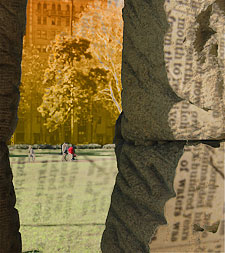Over recent weeks a series of articles have centred on the writings of atheists or agnostics, alarmed at the threat of religious belief.
 Richard Dawkins' views were presented in two episodes on the ABC TV's Compass. Christopher Hitchens' book God is not great was extracted in both the Weekend Australian and the Sydney Morning Herald. The SMH title was "How God's soldiers poison the well of life" and the Australian's "Father, Son and Holy Bogus."
Richard Dawkins' views were presented in two episodes on the ABC TV's Compass. Christopher Hitchens' book God is not great was extracted in both the Weekend Australian and the Sydney Morning Herald. The SMH title was "How God's soldiers poison the well of life" and the Australian's "Father, Son and Holy Bogus."
Sydneysiders read Peter Fitzsimons' cynicism over two Sundays in the Sun-Herald about Melbourne's Archbishop Philip Freier sending out a media release rejoicing in the translation of the new Kriol Bible. Fitzsimons' basic question was "Why is it necessary?'
These are a strong tilt at religious belief from prominent atheists in a position to express opinions in high profile outlets. As a result many Christians may be feeling inhibited in expressing publicly their faith in Jesus Christ. What greater hindrance can we find to our Mission to this city? The Evil One is surely at work to hinder us.
On reflection, I wonder whether these days there are far greater threats to Christian faith and commitment inside Christian circles rather than external to them?
Recently I read a web article that outlined views expressed by Marcus Borg from the group called The Jesus Seminar. At the "Church for the 21st Century' Conference held at the Episcopal Church's Washington National Cathedral, Borg argued that people today need to be re-educated about Christianity because the common understanding of Christianity of a generation or two ago has become "hugely unpersuasive" in our time. At first glance that seems plausible. We are all looking for ways to communicate the gospel effectively in today's world.
But Borg told his audience that today's need was for Christians to leave behind the "belief-centred paradigm' of the past and commit to a "transformation-centred paradigm'of faith. For Borg, "belief-centred' means assenting to a set of specific beliefs, while "transformation-centred' means primarily to be on a path, a way of being, for the individual and the world.
He said the belief-centred view sees the Bible as inerrant, infallible and directly from God's hand. In contrast, in the transformation-centred view the Bible is a human product and a social construction representative of particular people or peoples, place or time. "What we have in the Bible is how our spiritual ancestors saw things, not how God sees them," Borg said.
If we listen to him the Bible is thrown away, replaced by our experience.
Beside Borg we can place another internal attack on Biblical Christianity, one possibly more persuasive, but highly inimical to Biblical understanding.
In April last, the Arizona Daily Star published an article that discussed the terminology in Christian worship and liturgies used by some local churches.
It reports: ""Lord" has become a loaded word conveying hierarchical power over things, "which in what we have recorded in our sacred texts, is not who Jesus understood himself to be," St Phillip's [Episcopal Church] associate rector Susan Anderson-Smith said."
"The way our service reads, the theology is that God is love, period," St Phillip's deacon Thomas Lindell added. "Our service has done everything it can to get rid of power imagery."
"First Congregational United Church of Christ in Midtown even has a different name for The Lord's Prayer. They call it The Prayer of our Creator," and "St Francis in the Foothills United Methodist Church senior pastor David Wilkinson said. "We usually change "Lord' to "love' or "soul' or "light", it's pretty much a hierarchical, patriarchal image we're getting rid of."
Are similar re-writes of Biblical language occurring here?
I remember a wise bishop saying to me years ago, "I once moved outside the Bible, but what I found was so alarming I ran straight back inside the covers of Biblical faith." I echo his warning.




















